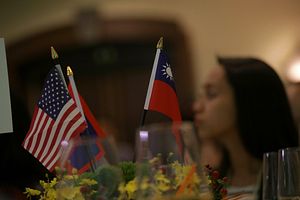Amid the U.S. response to COVID-19, U.S. President Donald Trump signed the TAIPEI Act (Taiwan Allies International Protection and Enhancement Initiative Act) of 2019 into law last week. The bill passed unanimously in the House of Representatives in March after the Senate version was unanimously approved last October. The new legislation aims to strengthen and expand the scope of the Washington-Taipei relationship, as well as the island’s ties to other countries and international organizations. Meanwhile, Taiwan has received praise for its management of the coronavirus outbreak, despite being shut out of the World Health Organization and the International Civil Aviation Organization.
In recent years, Beijing has been actively courting and winning over some of Taipei’s remaining diplomatic partners. And while the number of Taipei’s official diplomatic allies may be winnowing, any moves by Washington to bolster Taipei’s international standing have historically stoked the flames of Beijing’s greatest source of international sensitivity. The Act calls for the U.S. government to consider “increasing its economic, security, and diplomatic engagement with nations that have demonstrably strengthened, enhanced, or upgraded relations with Taiwan” — and, by the same token, consider “altering” relations with countries that “take serious or significant actions to undermine the security or prosperity of Taiwan.”
Resolving the Taiwan question — or reunification in Beijing’s eyes — remains China’s top priority. Accordingly, China’s Ministry of Foreign Affairs (MFA) was quick to respond to the passage of the new U.S. law. MFA spokesperson Geng Shuang condemned the legislation as a violation of the one-China principle and the three joint communiqués that delineated the normalization of U.S.-China relations. “We strongly urge the U.S. to correct its mistake, refrain from implementing this act and obstructing other countries’ pursuit of relations with China. Otherwise, it will be met with resolute countermeasures from the Chinese side,” Geng said.
The Global Times, a tabloid paper of the CCP, published an opinion warning that the TAIPEI Act could “alienate” Washington: “The double-dealing on the part of the White House has caused fierce criticism from vast Chinese people online, with [sic] could further poison cooperation and understanding between the two giant countries.”
The response on the other side of the Taiwan strait in Taipei was, by comparison, effusive. Taiwan’s Ministry of Foreign Affairs expressed the government’s thanks for the legislation in a tweet, accompanied by a picture of U.S. and ROC flags with the message “real friends real progress.” It added that the Act “also paves the way for expanded bilateral exchanges while preserving the country’s international space in the face of authoritarian China’s campaign of coercion.”
The U.S. bill’s signing into law also comes as the flurry to manage the international response to the coronavirus reveals how crises present new opportunities for diplomatic spats and cleavages to surface. Tit-for-tat conspiracies have emerged assigning blame for the origin of the virus between Washington and Beijing. China is recalibrating its messaging about its own domestic COVID-19 efforts, painting its harsh lockdown measures as effective, while ignoring the state apparatus’ delay in acknowledging the extent of the outbreak. Moreover, Beijing is seeking to take advantage of this moment to come to the aid of others by providing expertise and essential personal protective equipment (PPE) to fill shortages for medical personnel around the world. Some have dubbed this China’s “mask diplomacy.” As China stands to gain from assisting countries with rapidly escalating cases, Taiwan is also engaging in its own PPE aid campaign, donating more than 10 million masks to its diplomatic allies, European countries, and the United States.
Fluctuation in the U.S.-China relationship has come to be a new normal under the leadership of Trump and Xi. Although differences over economics and the trade war dominated headlines, the Trump administration has articulated a stronger U.S. commitment to Taiwan than many of his predecessors. From Trump’s phone call with Taiwan’s Tsai Ing-wen while president-elect of the United States, to the series of U.S. arms sales to the island and the enactment of the TAIPEI Act, Washington has appeared more willing to speak out against Beijing’s aggressive and coercive policies orchestrated to isolate Taipei and increase the island’s dependence on ties with the mainland. Only time can tell what effect the new legislation will have on the broader U.S.-China relationship, but it certainly adds to the latest slump.

































